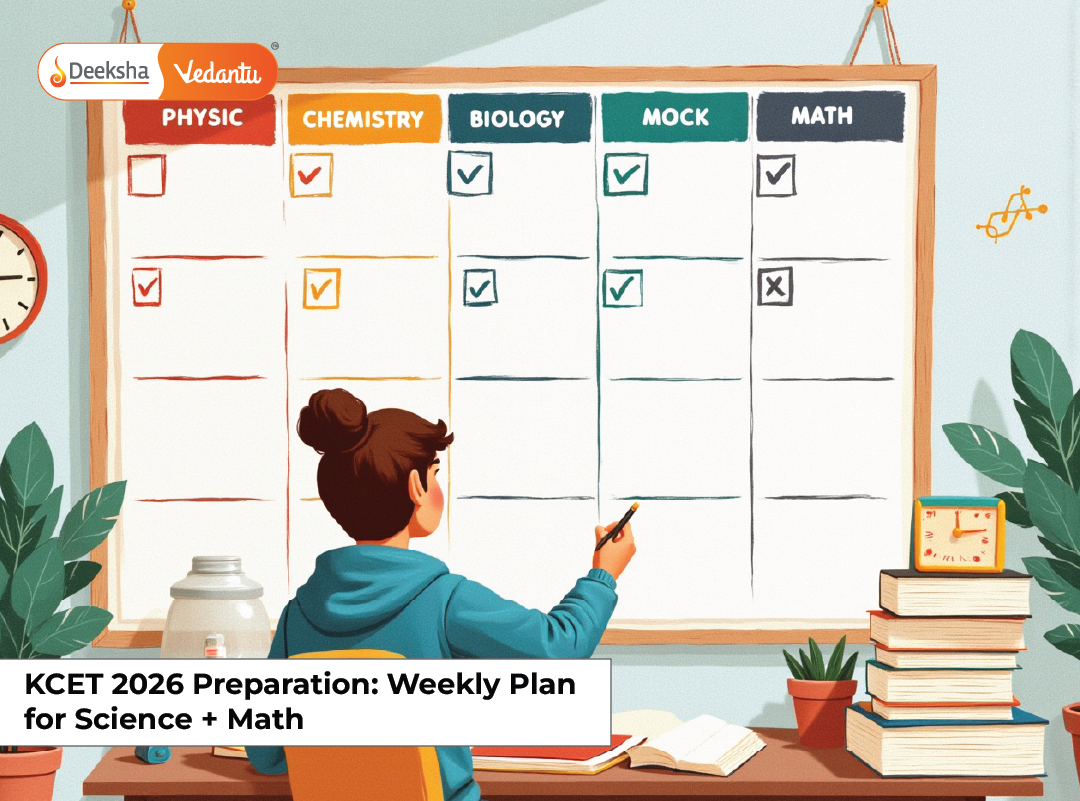Why a Weekly Plan Matters for KCET Preparation
The Karnataka Common Entrance Test (KCET) plays a pivotal role in determining admission to top-tier engineering and science colleges in Karnataka. It evaluates a student’s speed, accuracy, and conceptual depth across core subjects—Physics, Chemistry, and Mathematics—within a time-pressured format. Given the competitive nature of KCET, a scattered or inconsistent preparation approach is a risk students can’t afford.
A weekly preparation plan acts as a roadmap. It ensures you are focused, organized, and in control of your progress. It divides the syllabus into digestible units and balances concept building, problem-solving, and revision. More importantly, it encourages consistency and builds exam temperament over time.
A focused weekly strategy can:
- Minimize academic burnout by balancing school and entrance prep
- Foster consistent daily learning habits
- Make room for both micro (topic-level) and macro (subject-level) revisions
- Provide time for self-assessment via mock tests
- Help you build momentum gradually and sustainably
At Deeksha, we’ve developed a smart 12-week planner for KCET aspirants that aligns with the current syllabus structure and learning curve of a typical student. It’s tried, tested, and backed by years of student success stories.
How to Use This Weekly Plan
- Block 3–4 hours daily for exclusive KCET prep—aside from school classes or tuition
- Prefer studying during early morning or evening slots for fewer distractions
- Keep a master notebook with important formulas, reactions, and shortcuts
- Alternate between theoretical understanding and MCQ practice
- Designate one day a week for revision and one for mock tests
- Analyze test results every weekend and modify your upcoming week’s strategy
Consistency and feedback-driven study make this plan successful. Treat every week as a checkpoint in your journey.
Week-by-Week KCET 2026 Study Plan
Weeks 1–2: Strengthen Class 11 Basics
Physics: Units & Measurements, Motion in One and Two Dimensions, Newton’s Laws of Motion
Chemistry: Some Basic Concepts of Chemistry, Structure of Atom, Periodic Classification of Elements
Maths: Sets, Relations and Functions, Complex Numbers, Quadratic Equations
- Recap basics and clear Class 11 backlogs if any
- Solve introductory level numericals from NCERT
- Start maintaining a mistake tracker for every subject
Weeks 3–4: Build Application Skills
Physics: Work, Energy and Power, System of Particles, Rotational Motion
Chemistry: Chemical Bonding, States of Matter, Thermodynamics
Maths: Sequences and Series, Permutations and Combinations
- Begin timed practice sessions for each topic
- Use NCERT Exemplar and Deeksha assignments to cover varied question types
- Practice 30 MCQs per subject per day
Weeks 5–6: Focus on Problem-Solving Mastery
Physics: Gravitation, Mechanical Properties of Solids & Fluids, Oscillations and Waves
Chemistry: Equilibrium, Redox Reactions, Hydrogen, The s-Block Element
Maths: Binomial Theorem, Limits and Continuity, Basic Differentiation
- Attempt cross-topic tests to simulate real exam sections
- Solve higher-difficulty MCQs to deepen understanding
- Revisit tough concepts from earlier weeks
Weeks 7–8: Start Class 12 Concept Application
Physics: Electrostatics, Current Electricity, Capacitors
Chemistry: Solid State, Solutions, Electrochemistry
Maths: Matrices, Determinants, Application of Derivatives
- Transition into Class 12 chapters
- Maintain weekly MCQ accuracy >75%
- Integrate handwritten notes for quick reference
Weeks 9–10: Merge and Strengthen Concepts
Physics: Magnetic Effects of Current, Alternating Current, Ray and Wave Optics
Chemistry: Chemical Kinetics, Surface Chemistry, The p-Block Elements
Maths: Integration, Differential Equations, Probability
- Take one full-length mock test mid-week and another on Sunday
- Time yourself for each section (80 mins) to simulate real exam pressure
- Analyze score breakdowns: subject-wise and topic-wise
Weeks 11–12: Final Phase – Full Revision and Practice
- Revisit short notes and formula books daily
- Focus heavily on previous year KCET questions
- Work on high-weightage topics across all subjects (e.g., Ray Optics, Thermodynamics, Calculus)
- Solve at least 100 MCQs daily across subjects
- Focus more on application and accuracy rather than exploring new concepts
Deeksha’s Weekly Mentorship Support
What sets Deeksha apart is not just the study material, but the entire ecosystem of learning support:
- Tailored Weekly Goals: Based on each student’s strength and improvement areas
- Live Feedback & Progress Reviews: Regular performance evaluations through mentor check-ins
- AI-Based Dashboards: Track your growth with data on speed, accuracy, and retention
- Strategic Motivation Sessions: To build confidence and keep anxiety at bay
- Peer-Based Concept Sessions: Collaborative learning with likeminded aspirants
This mentorship model helps students not only stay on track, but also thrive under expert guidance.
FAQs
1. How many hours should I study daily for KCET 2026?
An average of 3–4 focused hours daily is optimal. Include a mix of theory, MCQs, and revision.
2. Can I balance school syllabus and KCET prep?
Absolutely. This plan mirrors the board curriculum so your entrance and school study support each other.
3. How often should I give mock tests?
Start with one per week from Week 5, scaling to 2–3 in the last month.
4. Should I follow only NCERT or use coaching modules too?
Begin with NCERT. Once the basics are clear, integrate Deeksha MCQs and past KCET papers.
5. How do I know if I’m improving?
Track your scores, accuracy, and time taken. Your error log should reduce week by week.
Conclusion
KCET 2026 success doesn’t come overnight—it’s built through daily effort, weekly discipline, and a long-term vision. With this strategic plan, you’re not just preparing for an exam—you’re preparing for a strong academic future.
Deeksha’s weekly mentorship model ensures you don’t walk this path alone. With curated resources, regular evaluation, and continuous feedback, every student gets a customized path to excellence.
Start today. Stay consistent. The rank you dream of is built one week at a time.
Table of Contents














Get Social